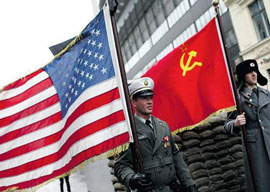
February 26, 2014

Similarities and differences between Russian and American conservatism”especially in regard to the topic of the moment, Ukraine“can be observed in the thought of Russian geopolitical theorist Aleksandr Dugin, director of the Center for Conservative Studies at Moscow State University.
Dugin’s program of “Neo-Eurasianism” has come under attack in the West since Vladimir Putin proposed a Eurasian Union of former Soviet republics to compete with the European Union.
Dugin has cleverly adapted traditional Czarist and Soviet political goals to postmodern tropes about diversity and multiculturalism:
The world today finds itself on the brink of a post-political reality”one in which the values of liberalism are so deeply embedded that the average person is not aware there is an ideology at work around him. As a result, liberalism is threatening to monopolize political discourse and drown the world in a universal sameness, destroying everything that makes the various cultures and peoples unique.
Yet Dugin’s analysis of the implications always seems to point toward the same solution: greater power for the Kremlin. Dugin proudly proclaims himself a “statist,” which doesn’t make him in sync with the Tea Party. And in his vision the Muscovite state expands in territory and influence.
After last week’s coup in Kiev, Dugin said in an interview on Russian state television:
I suggest that it is necessary that Russia, in an organized way, help Eastern Ukraine and Crimea.
When asked by the interviewer what he meant by “an organized way,” Dugin replied, “with tanks.”
But like many American invade-the-world spokesmen, Dugin went on to say that he wasn’t calling for an incursion out of concern for his country’s national interest:
We need to militarily strengthen the East and Crimea, not in our own interest but in the interest of Ukraine.
Dugin at least has the justification that invasion and autocracy are ancient Russian traditions. He recently pointed out:
The fundamental axiom of Russian conservatism can be traced to the time of the monarchy and is known by a simple formula: “Good tsar”bad elites.”
(That explains much of the popularity of Vladimir Putin with the Russian electorate: After the anarchic looting of the Yeltsin years, the new oligarchs are now at least under Kremlin control.)
In contrast, the document once respected as the most carefully considered legacy of the Founding Fathers”George Washington’s Farewell Address (which received help from Alexander Hamilton, James Madison, and John Jay)”advised against “foreign entanglements.”
Because Ukraine (a word that may mean “borderlands,” although like everything else about the place, the etymology remains in dispute) lacks both natural defenses and an agreed-upon national identity, this wide expanse of Slavic-language-speaking territory has long attracted the attention of the most audacious geopolitical philosophers. They have seen it as the crucial blank slate upon which to inscribe their designs for world domination. In turn, Ukraine’s fundamental vulnerability motivates locals toward extremes of nationalism (although not always in agreement with their neighbors).
Ukraine’s perennially precarious geopolitical situation was memorably parodied in a 1995 Seinfeld episode in which Kramer and Newman are playing the board game Risk on the subway. Kramer taunts Newman, “I’ve driven you out of Western Europe, and I’ve left you teetering on the brink of complete annihilation.”
Newman desperately bluffs, “I’m not beaten yet! I still have armies in the Ukraine.”
“The Ukraine? You know what the Ukraine is, it’s a sitting duck,” scoffs Kramer. “A road apple, Newman. The Ukraine is weak. It’s feeble. I think it’s time to put the hurt on the Ukraine….”
A fellow passenger, a deep-voiced Ukrainian in a fur hat, is naturally outraged. He asks, “Ukraine is game to you?” before smashing the board.
To the misfortune of the people who live there, Ukraine is a game to the idea men (and women, such as neoconservative insider Victoria Nuland) of numerous surrounding deep states.
As the most populous European region of arguable nationality, Ukraine has long played a sizable role in geopolitical theorizing about oceanic versus continental strategies.
The land v. sea distinction is fundamental to Dugin, who argues:
We have to see the struggle for geopolitical power as the old conflict of land power represented by Russia and sea power represented by the USA and its NATO partners….The 1990s was the time of the great defeat of the land power represented by the USSR. Mikhail Gorbachev refused the continuation of this struggle. This was a kind of treason and resignation in front of the unipolar world.
The notion of America as, by nature, a sea power was popularized by Alfred Thayer Mahan. America’s energies were long absorbed settling its West, but in 1890, the year the Census Bureau found the frontier to be finally closed, Captain Mahan introduced Americans to geopolitical strategizing with The Influence of Sea Power Upon History: 1660″1783.
Mahan’s analysis of Britain’s rise provided a suitable ideology for the Spanish-American War of 1898, with consequences for which we’re still paying. The Los Angeles Herald reported on December 2, 1898:
Mahan insists weightily on the great military importance of Porto Rico, which is to Cuba, to the future Isthmian canal and to the Pacific coast what Malta is or may be to Egypt and beyond.